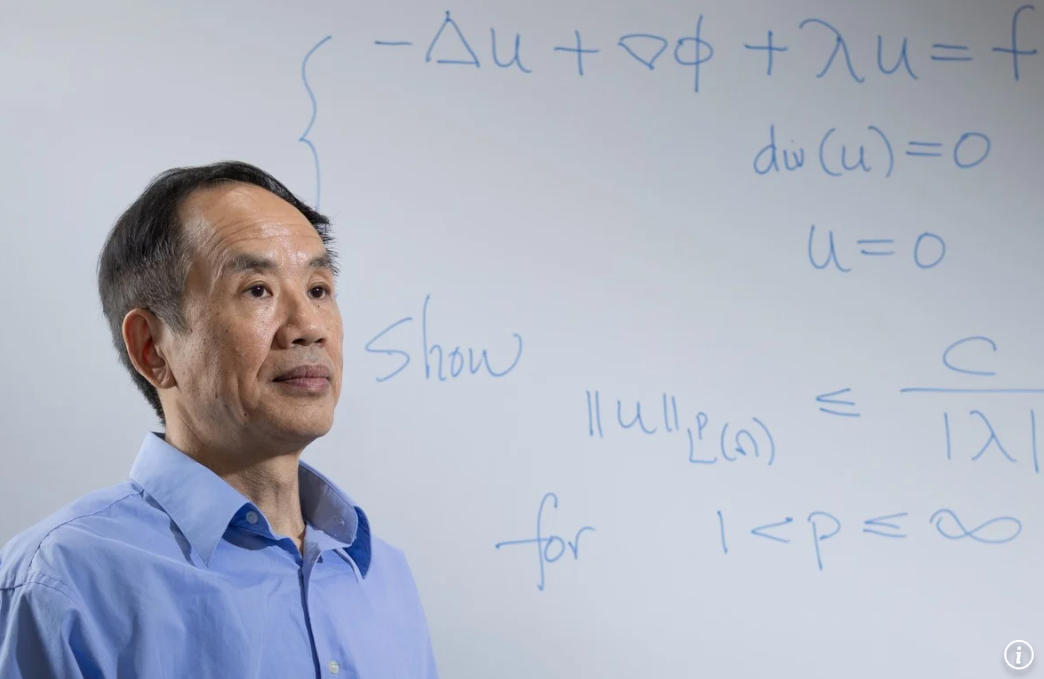[2025-09-09]SCMP评论区:在美国待了40年后,开创性数学家申仲伟回到中国
文章原始标题:After 40 years in US, pioneering mathematician Zhongwei Shen returns to China
国外来源地址:https://www.scmp.com/news/china/science/article/3324826/after-40-years-us-pioneering-mathematician-zhongwei-shen-returns-china?module=top_story&pgtype=section
该译文由蓝林网编辑,转载请声明来源(蓝林网)
内容简介: 申仲伟将在杭州西湖大学继续他在偏微分方程和调和分析领域数十年的研究。

Shen will continue decades of research on partial differential equations and harmonic analysis at Westlake University in Hangzhou
申仲伟将在杭州西湖大学继续他在偏微分方程和调和分析领域数十年的研究。
He joined Westlake’s School of Science in July to continue decades of research on partial differential equations and harmonic analysis – mathematical fields that form the backbone of modelling the natural world, according to the university website.
据西湖大学官网介绍,申教授于7月加入西湖大学理学院,继续他在偏微分方程与调和分析领域数十年的研究——这些数学分支是对自然世界建模的基础。
Shen, who was admitted to Peking University as a maths major at just 14, has spent 40 years in the US, including nearly three decades at the University of Kentucky, where he became a distinguished professor and served as chair of the mathematics department.
A founding member of the inaugural class of American Mathematical Society Fellows, Shen has also maintained close ties with China, including being named a Changjiang Scholar at Lanzhou University in 2015.
申仲伟14岁时即被北京大学数学系录取,在美国度过了40年,其中近三十年在肯塔基大学任教,期间成为杰出教授并担任数学系主任。他还是首届美国数学学会的创始成员之一,并与中国保持密切联系,2015年曾被聘为兰州大学长江学者。
In an official announcement, Shen said he had long considered returning to China and closely followed developments back home. “I never considered going to another country,” he said. “If I were to leave, it’d have to be China, because that’s home.”
在一份官方声明中,申仲伟表示,他一直考虑回国,并密切关注祖国的发展。“我从未考虑去其他国家,”他说,“如果要离开(美国),那一定是回中国,因为那里是家。”
He said he was drawn to Westlake by its high-level, research-focused approach and the international character of its maths department. “I hope to help Westlake University become a top research university,” he added.
他表示,西湖大学高水平、以科研为主导的办学理念以及数学系的国际化气息吸引了他。“我希望助力西湖大学成为顶尖研究型大学,”他补充道。
Shen’s research bridges advanced mathematics and physics, using equations to describe complex systems ranging from fluid flows to quantum particles. Much of his work focuses on problems in irregular or “rough” spaces where traditional methods fail, and he has developed tools that have improved understanding of how materials with complicated structures behave.
申的研究将高等数学与物理学相结合,利用方程描述从流体流动到量子粒子的复杂系统。他的大部分工作聚焦于传统方法失效的“不规则”或“粗糙”空间中的问题,并开发出新工具,提升了人们对复杂结构材料行为的认识。
Born in Hengyang, Hunan province in 1964, Shen was raised mainly by his grandparents. His mother taught maths at a local primary school, while his father worked as a technician at the Northwest Nuclear Industrial Base – one of China’s earliest and largest nuclear hubs, located thousands of kilometres away in Xinjiang.
申仲伟1964年出生于湖南衡阳,主要由祖父母抚养长大。母亲在当地小学任数学教师,父亲则在新疆的西北核工业基地工作,该基地是中国最早、最大规模的核工业基地之一,距离家乡数千公里。
Shen started primary school at the age of five – so young that his mother seated him in the back row to avoid distracting older classmates. At nine, he and his mother moved to join his father at the nuclear base, where he stayed through high school.
申五岁入读小学,年纪太小,母亲特意让他坐在最后一排,以免影响年长的同学。九岁时,他随母亲迁往新疆,与在核基地工作的父亲团聚,并在那里完成中学学业。
In 1978, a year after China reinstated the national college entrance exam following the Cultural Revolution, Shen was admitted to the maths department at Peking University. He was only 14 and still in his first year of high school, inspired by a magazine profile of mathematician Chen Jingrun and his work on Goldbach’s conjecture.
During graduate studies at the Chinese Academy of Sciences, Shen met visiting professors from the University of Chicago and was drawn to their work, leading him to pursue a PhD there. After completing his doctorate, he did postdoctoral research at Princeton University under Elias M. Stein, one of the world’s leading figures in harmonic analysis.
1978年,中国恢复高考的次年,年仅14岁、还在读高一的申仲伟被北京大学数学系录取。他的动力来源于一本杂志上介绍数学家陈景润及其歌德巴赫猜想研究的文章。
在中国科学院读研究生期间,申结识了前来访问的芝加哥大学教授,并对他们的工作产生浓厚兴趣,最终赴芝加哥大学攻读博士。博士毕业后,他在普林斯顿大学著名调和分析专家Elias M. Stein门下做博士后研究。
Now at Westlake, Shen said he hoped to keep pushing forward the problems that had defined his career. “My work is still about solving one problem after another, advancing the field,” he said.
如今在西湖大学,申表示希望继续推进自己职业生涯中长期关注的数学难题。“我的工作仍然是不断解决一个又一个问题,推动领域前进,”他说。
Collaboration, he added, was becoming central to mathematics, with each researcher bringing a different “toolbox” and perspective. At Westlake, he said he looked forward to exchanging ideas across disciplines.
他还补充说,合作正成为数学研究的核心,每位研究者都带来不同的“工具箱”和视角。在西湖大学,他期待能与其他学科学者交流思想。
Shen is also eager to return to the classroom. “I like teaching students, especially undergraduates,” he said. “They have enthusiasm and curiosity, and guiding them to see why a complicated formula must be true is one of the joys of teaching.”
申也渴望重返课堂。“我喜欢教书,尤其是教本科生,”他说,“他们充满热情和好奇心,引导他们理解复杂公式为何成立,是教学的一大乐趣。”
Raymond@1 L.
America has been a great place for Chinese people to be technologically educated, just like how Europeans had contributed to the American ascendance in science. Now it is China's turn for ascendance. The return of China's prodigal sons and daughters reflects their wanting to be part of this renaissance.
美国一直是中国人接受科技教育的好地方,就像当年欧洲人曾为美国在科学领域的崛起做出过贡献一样。现在轮到中国崛起了。中国游子们的回归,反映了他们希望参与这场复兴的愿望。
Michael L.
@Raymond@1 L. lol he spent his productive years in the US and now goes back to retire. What is left after 40 years of working?
哈哈,他在美国度过了最有生产力的那些年,现在退休了才回去。工作了四十年之后还能剩下什么呢?
TrueGreen
@Michael L. Shen is younger than Trump. If nothing is left in the tank for Shen, then Trump must be running on fumes,.
申比特朗普年轻。如果申已经油尽灯枯,那特朗普恐怕早就在靠最后一口气撑着了。
Jake C.
None of these are Field medal winners though US has the most field medal winning mathematicians. So not sure what actual contributions these few returning persons have made .
不过这些人里没有菲尔兹奖得主,而美国拥有最多的菲尔兹奖得主数学家。所以我不确定这几位回国的人到底做出了什么实际贡献。
Raymond W.
@Jake C. Obviously a spent force.
显然已经江郎才尽了。
Nicow T.
@Jake C. clearly you don't know anythign about math and science in general. There are plenty of world-class mathematicians who have never earned a fields medal and plenty of other awards
很明显你对数学和科学一无所知。有很多世界级的数学家从未获得过菲尔兹奖,也有很多其他奖项。
TrueGreen
@Jake C. Explain why US have many mathematics field medals winners but the maths skills of the average high school student is lower than that of a fifth grader in East Asia?
请解释为什么美国有很多数学菲尔兹奖得主,但普通高中生的数学水平却低于东亚五年级学生?
Michael L.
@Truegreen Americans dominate not only in math but also in all other fields of human endeavor, such as chemistry, physics, economics, literature, music, and film. They have won two-thirds of all Nobel Prizes despite comprising just 4% of the global population. A key difference is that American children are not simply taught to study for tests; they are encouraged to explore their personal interests (and question authority :)
美国人在数学领域占据主导地位,在化学、物理、经济学、文学、音乐和电影等其他所有人类活动领域也同样如此。尽管只占全球人口的4%,他们却获得了三分之二的诺贝尔奖。一个关键的区别在于,美国的孩子不仅仅被教导为考试而学习,他们还被鼓励探索个人兴趣(并质疑权威 :)
TrueGreen
@Michael L. Tests scores low because they explore their personal interest. Put simply, they didn’t study. Got that!
考试分数低是因为他们在探索个人兴趣。简单来说,就是他们没学习。我明白了!
SophieZhang
People keep talking about how these scientists are coming back to China as if it's some huge win, but let's be real – they built their careers in the US where the research environment, funding, and freedom to innovate are way ahead. Returning now is nice for publicity, but the real breakthroughs already happened abroad. It's like eating the cake and then bringing back the crumbs.
大家总是说这些科学家回国是多么大的胜利,但说实话,他们的事业是在美国发展的,美国的研究环境、资金和创新自由度都遥遥领先。现在回国挺有宣传效果,但真正的突破早就在国外完成了。这就像蛋糕都吃光了,只带回点碎屑。
BigChen
@SophieZhang That's a pretty cynical take. Have you actually looked at how much China's research landscape has changed? Top labs, major funding, and real academic freedom are becoming the norm now. These returning scholars can help build a system that rivals or even surpasses the West. You just want to cling to old stereotypes.
你这想法真够愤世嫉俗的。你了解过现在中国的科研环境变化有多大吗?顶级实验室、巨额资金,真正的学术自由都在成为常态。这些回国的学者能帮助中国建立一个能和西方媲美甚至超越的体系。你就是死守老旧偏见罢了。
MathNerd2021
The Fields Medal is not the only standard for achievement in mathematics. Some of the most influential mathematicians never got one. If you’re measuring a person’s life’s work only by a trophy, you’re missing the point. Plus, many top scientists want to mentor the next generation in their homeland, and that’s worth more than any medal.
菲尔兹奖绝不是衡量数学成就的唯一标准。有些最具影响力的数学家也没得过。如果你只用奖杯来衡量一个人的一生,那你就搞错重点了。而且,很多顶级科学家选择回国培养下一代,这种价值远超任何奖项。
TigerDad
@MathNerd2021 Sure, but in China, it’s all about face and titles. They love to parade these “returnees” for propaganda, even if their best days are behind them. Meanwhile, real innovation still comes from the US and Europe. When was the last time China produced a game-changing scientific theory on its own?
当然,但在中国,最看重的就是面子和头衔。就爱把这些“海归”当宣传工具,哪怕他们巅峰已过。真正的创新还是来自美欧。中国上一次独立提出改变世界的科学理论是什么时候?
WangXiaoming
@TigerDad That’s a lazy argument. There are tons of Chinese scientists making breakthroughs every year, but the Western media rarely reports it. Don’t let your inferiority complex blind you to reality. The trend is clear: more talents are coming back, and China’s scientific output is rising fast.
你这说法太片面了。每年都有大量中国科学家取得突破,只是西方媒体根本不报道。别让你的自卑感蒙蔽了双眼。趋势很明显:人才回流,中国的科研产出正在飞速增长。
AuntieLi
Some of you are just jealous. If you had the skills and opportunities, you’d do the same – go overseas to learn, then come home to enjoy the fruits. It’s called “having your cake and eating it too,” and I say good for them! Let the haters hate, the smart ones know where the future is.
你们有些人就是眼红。如果你有这个本事和机会,不也会出国深造再回家享福吗?这就叫“名利双收”,我觉得他们做得好!让那些酸的人继续酸,聪明人都知道未来在哪。
BananaRepublic
Let’s be honest, China still has a massive problem with academic fraud, bureaucracy, and lack of original thinking. No amount of returnees can fix that overnight. Until professors stop copying each other and chasing ridiculous metrics, the West will always be ahead in real innovation.
说实话,中国的学术造假、官僚作风和原创力缺乏问题还很严重。再多的海归也一夜之间改变不了。只要教授们还在互相抄袭、追数据造泡沫,西方在真正的创新上就一直领先。
DrYu
@BananaRepublic Academic fraud exists everywhere, including the US (hello, fake cancer studies?). At least China is starting to tackle these issues head-on. And don’t pretend the US isn’t full of bureaucracy – ever tried getting a grant from the NSF? It’s a nightmare. Every country has problems.
学术造假到处都存在,美国一样有(假癌症论文见过吗?)。至少中国开始正面解决这些问题了。别装美国没有官僚主义——你申请过NSF的经费吗?简直噩梦。哪个国家都有自己的问题。
DeepThink
The main reason so many go to the US is because of the open environment and top-tier resources. But now that China is catching up in labs and salaries, it’s only natural people return. National pride counts for something too – not everything is about money or fame.
那么多人去美国的主要原因就是开放的环境和一流的资源。但现在中国在实验室建设和薪酬上赶上来了,人才回流很正常。民族自豪感也很重要——不是所有人都只看钱和名声。
UncleSamLOL
@DeepThink “National pride” is just code for “can’t make it in the US anymore.” If they were really the best, they’d be getting tenure at MIT, not running back to hang a red flag in Hangzhou. Don’t kid yourself.
“民族自豪感”其实就是“在美国混不下去了”的代名词。如果真那么牛,早就在MIT拿到终身教职了,哪还用跑回杭州举红旗?别骗自己了。
MaoOnTheRun
@UncleSamLOL Keep dreaming, bro. US tenure tracks are a closed club. Even Nobel laureates get rejected if they’re not “the right fit.” A lot of brilliant minds just get tired of the BS and go where they’re valued. America isn’t the center of the universe anymore.
做梦吧兄弟。美国终身教职就是个封闭小圈子。就算你是诺奖得主,不合群一样被刷。很多牛人就是厌倦了那一套,去到能真正被重视的地方。美国早不是宇宙中心了。
AliceWang
Reading some of these comments, it’s obvious that people are triggered by the idea of China rising. Whether or not these scientists win big prizes, the fact that they’re returning is a huge signal. Ten years from now, the talent war will be global, and people will look back at these moves as the real turning point.
看这些评论就知道,有些人就是一听到中国崛起就玻璃心。无论这些科学家有没有大奖,回归本身就意义重大。十年后,全球争夺人才,大家会发现现在才是真正的转折点。




